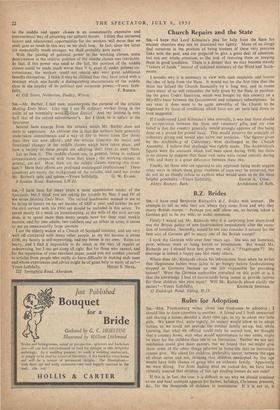Church Repairs and the State
SIR,—I hope that Lord Kilmaine's plea for help from the State for ancient churches may not be dismissed too lightly. Many of us clergy find ourselves in the position of being trustees of these very precious links with the past, and are prepared to give a great deal of attention, but not our whole attention, to the task of restoring them or keeping them in good condition. There is a danger that we may become merely " raisers of funds " instead of ordained ministers of the Word and Sacra- ments I wonder why it is necessary to view with such suspicion and horror the idea of help from the State. It would not be the first time that the State has helped the Church financially-by a long way, and in recent years many of us will remember the help given by the State in purchas- ing the great Codex Sinaitictis, which was bought by this country on a fifty-fifty basis between the Government and voluntary subscriptions. In any case, it does seem to be quite unworthy of the Church to be frightened by fears of conditions which have not yet been laid down or even suggested.
If I understood Lord Kilmaine's plea correctly, it was that there should be co-operation between the State and voluntary gifts, and my own belief is that the country generally would strongly approve of this being done on a pound for pound basis. This would preserve the principle of voluntary giving and would also halve our anxieties. The figures given by the Archbisht,p of Canterbury were challenged in the Church Assembly. I believe that challenge was rightly made. The Archbishop's figures were the amounts which had been spent during 1950, but there is no reason to suppose that those vast sums were raised entirely during 1950, and there is a great difference between these two.
Finally, let those who are opposed to any approach being' made suggest other ways in which these great treasures of ours may be preserved, but do not let us Blindly refuse to explore what would seem to be the most
Abbey Rectory, Bath. Archdeacon of Bath.






















































 Previous page
Previous page